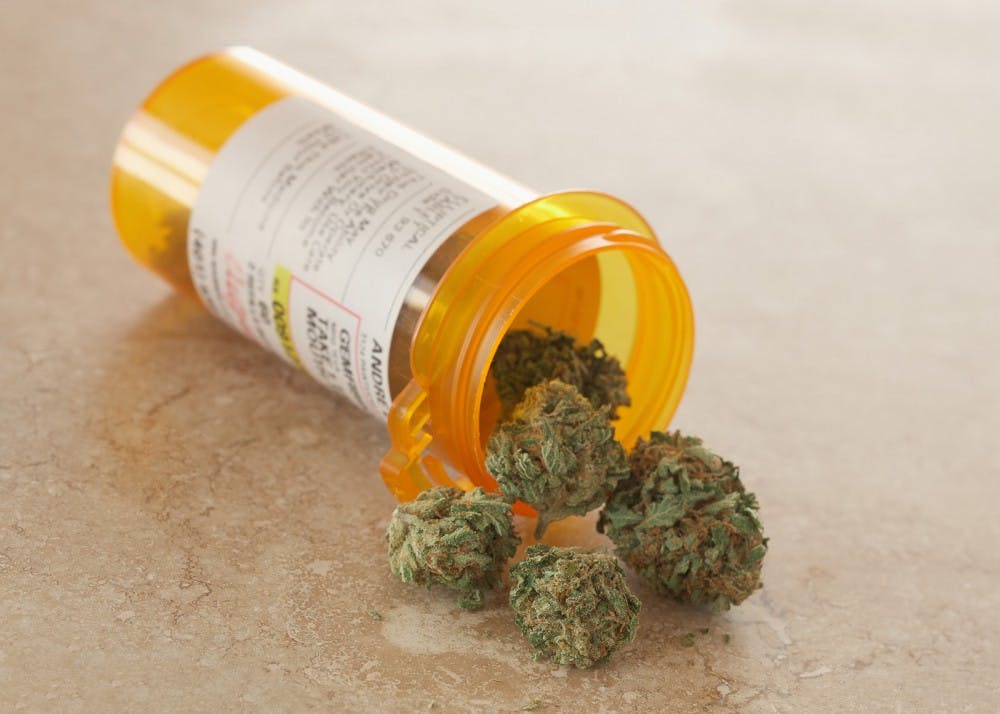Many states, 33 to be exact, have legalized medical marijuana. Unsurprisingly, Indiana is not one of them.
Indiana is not the most progressive state on many issues, and legalizing marijuana for medicinal purposes is no exception.
When we think of a marijuana user, we probably conjure up images of a Seth Rogen-esque stoner and quotes from Jeff Bridges’ character “the Dude” in the film "The Big Lebowski." What we don’t picture are veterans suffering from combat-related pain, anxiety and post-traumatic stress disorder.
The federal government classifies marijuana as a Schedule I narcotic like heroin. Nevertheless, a recent survey from the Department of Veterans Affairs estimates that more than one million veterans use marijuana for medicinal purposes. Like any other illegal drug or contraband, people will find a way to obtain it.
Since Hoosier veterans cannot receive medical marijuana in Indiana, they resort to moving to places where medical cannabis programs are in place.
Terry Moore told CBS 4 Indianapolis he uses marijuana as therapy for PTSD he said stemmed from his childhood. The Vietnam War veteran moved to Illinois to take part in the state’s medical cannabis program.
“I’m in exile. I want to come home. I'm not welcome home now, and I gave my whole life to this state,” Moore said in the interview.
Instead of turning our veterans into cannabis refugees, the government needs to treat the injuries they received while protecting the U.S. Indiana needs to have a medical marijuana program on the books.
Critics of medical marijuana claim that there is a lack of research on the benefits of marijuana relating to post-traumatic stress disorder. However, the testimonials of veterans like Moore on the therapeutic benefits of marijuana are hard to refute.
There’s a lack of research on marijuana because of its Schedule I classification. This legally restricts scientists’ ability to experiment with the medicinal properties of the drug. It also restricts Veterans Affairs doctors from talking with patients about using medical marijuana with other medications.
Furthermore, prescribing marijuana to wounded veterans instead of opioids to treat their pain is a safer alternative. Data from the Centers for Disease Control and Prevention shows that 1,840 Hoosiers died of drug overdoses in 2017, and a vast majority of those were caused by opioids.
The U.S. Drug Enforcement Administration drug sheet for marijuana reports that no deaths from marijuana overdose have ever been recorded.
Veterans are put in danger by not communicating with their doctors about the effects of medical marijuana as it can negatively interact with some prescription medications.
Politically, the medical cannabis movement is garnering some support at the Statehouse. Last year, Gov. Eric Holcomb signed a law legalizing low-THC cannabidiol, or CBD, oil.
State Rep. Jim Lucas, R-Seymour; Sen. Karen Tallian, D-Portage; and the newly elected Sen. J.D. Ford, D-Indianapolis have reached across the partisan divide and are advocating for legalization. Tallian introduced two bills at the start of this session that would regulate cannabidiol and reduce the amount of marijuana that qualifies as a possession charge.
Following Tallian’s example, the best way for any government to implement medical marijuana programs is through regulation and decriminalization in order to ensure safety while building on our understanding of the benefits of cannabis.
Marijuana is no different than any other pharmaceutical drug. It can be beneficial with further research, government regulation and strict dosage measures.
Much has changed since former President Richard Nixon’s declaration of a war on drugs. For example, America has the highest incarcerated population in the world, and 20 percent of these incarcerations are nonviolent drug offenses. It’s time we focus our energy on combating the abuse of prescription drugs.
We also have to break down the stoner stigma of marijuana use. It is safer than opioids and truly helping veterans. Marijuana is a legitimate alternative. However, in Indiana, it’s a matter of whether the Republican supermajority sees it that way.
Correction: A previous version of this story called the federal agency tasked with handling medical treatment for eligible military veterans is the Department of Veterans Affairs. The IDS regrets this error.
Clarification: Terry Moore's PTSD began as a result of his childhood. The article implied it may have started as a combat-related issue.






